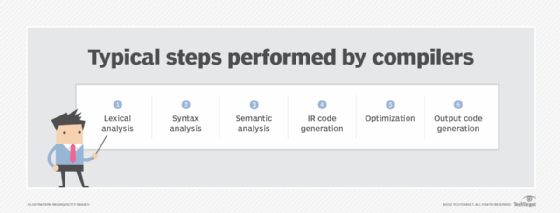compiler
What is a compiler?
A compiler is a special program that translates a programming language's source code into machine code, bytecode or another programming language. The source code is typically written in a high-level, human-readable language such as Java or C++. A programmer writes the source code in a code editor or an integrated development environment (IDE) that includes an editor, saving the source code to one or more text files. A compiler that supports the source programming language reads the files, analyzes the code, and translates it into a format suitable for the target platform.
Compilers that translate source code to machine code target specific operating systems and computer architectures. This type of output is sometimes referred to as object code (which is not related to object-oriented programming). The outputted machine code is made up entirely of binary bits -- 1s and 0s -- so it can be read and executed by the processors on the target computers. For example, a compiler might output machine code for the Linux x64 platform or Linux ARM 64-bit platform.
Some compilers can translate source code to bytecode instead machine code. Bytecode, which was first introduced in the Java programming language, is an intermediate language that can be executed on any system platform running a Java virtual machine (JVM) or bytecode interpreter. The JVM or interpreter converts the bytecode into instructions that can be executed by the hardware processor. A JVM also makes it possible for the bytecode to be recompiled by a just-in-time compiler. (See also: Java compiler)
Some compilers can translate source code into another high-level programming language, rather than machine code or bytecode. This type of compiler might be referred to as a transpiler, transcompiler, source-to-source translator or it might go by another name. For example, a developer might use a transpiler to convert COBOL to Java.
Regardless of the source language or the type of output, a compiler must ensure that the logic of the output code always matches that of the input code and that nothing is lost when converting the code. A compiler is, in the strictest sense, a translator and must ensure that the output is correct and preserves all the original logic.
How does a compiler work?
Compilers vary in the methods they use for analyzing and converting source code to output code. Despite their differences, they typically carry out the following steps:
- Lexical analysis. The compiler splits the source code into lexemes, which are individual code fragments that represent specific patterns in the code. The lexemes are then tokenized in preparation for syntax and semantic analyses.
- Syntax analysis. The compiler verifies that the code's syntax is correct, based on the rules for the source language. This process is also referred to as parsing. During this step, the compiler typically creates abstract syntax trees that represent the logical structures of specific code elements.
- Semantic analysis. The compiler verifies the validity of the code's logic. This step goes beyond syntax analysis by validating the code's accuracy. For example, the semantic analysis might check whether variables have been assigned the right types or have been properly declared.
- IR code generation. After the code passes through all three analysis phases, the compiler generates an intermediate representation (IR) of the source code. The IR code makes it easier to translate the source code into a different format. However, it must accurately represent the source code in every respect, without omitting any functionality.
- Optimization. The compiler optimizes the IR code in preparation for the final code generation. The type and extent of optimization depends on the compiler. Some compilers let users configure the degree of optimization.
- Output code generation. The compiler generates the final output code, using the optimized IR code.

Compilers are sometimes confused with programs called interpreters. Although the two are similar, they differ in important ways. Compilers analyze and convert source code written in languages such as Java, C++, C# or Swift. They're commonly used to generate machine code or bytecode that can be executed by the target host system.
Interpreters do not generate IR code or save generated machine code. They process the code one statement at a time at runtime, without pre-converting the code or preparing it in advance for a particular platform. Interpreters are used for code written in scripting languages such as Perl, PHP, Ruby or Python.
See also: decompile, yet another compiler compiler, parser, software toolchain, native code, assembler
